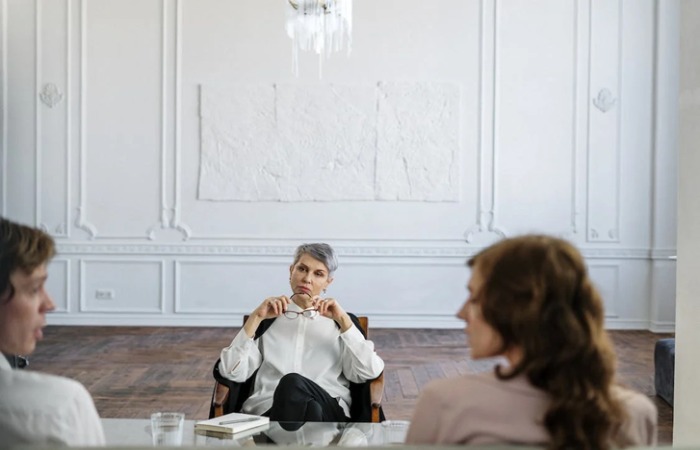Mental health is an important aspect of any relationship. Couples counseling provides couples with the opportunity to discuss their concerns and disagreements in a safe, supportive environment, as well as establish healthier patterns for communication and problem-solving.
This article will explore the benefits of couples counseling for mental health, including improved communication, better conflict resolution skills, enhanced emotional understanding, and increased trust between partners.
Table of Contents
Impact of Couple Counseling For Mental Health
Couple counseling focuses on strengthening partnerships by helping them identify and work through any difficulties they may be experiencing. Like a lighthouse guiding ships safely across stormy seas, couples counseling guides partners towards more harmonious relationships.
Research has demonstrated that couples counseling can have powerful positive effects on mental health outcomes. Studies have found that this type of intervention leads to greater satisfaction with the relationship and improved psychological functioning in both individuals involved in the partnership.
In addition, research suggests that participating in couples counseling can lead to increased understanding between two people which, in turn, promotes better problem-solving skills when disagreements arise.
Given these benefits, it is clear that couples counseling provides invaluable assistance for those seeking improved mental health within their partnerships.
By providing guidance and support from a qualified professional therapist or counselor, couples are able to gain insight into how unresolved conflict might be affecting their wellbeing and learn new ways to manage difficult situations effectively.
Benefits To Seek Couple Counseling
Couples counseling can be a beneficial tool for mental health. It is important to consider the reasons why couples may seek out such services, as well as potential benefits that could come from completing counseling sessions. Following are some benefits of couple counseling;
- The primary benefit of couples counseling is improved communication and understanding between partners.
- Couples counseling also gives individuals an opportunity to explore difficult topics in a supportive environment with a trained professional. These conversations often lead to greater insight into how each partner’s individual needs interact within the larger context of the relationship.
- By attending therapy together, both individuals will learn new skills to use during conversations with each other which helps them better understand one another’s points of view. This in turn can lead to greater satisfaction and more positive interactions within the relationship.
- In addition, couples counseling provides an opportunity for partners to work through disagreements in a safe environment where they are encouraged to express their feelings openly without fear of judgment or criticism.
- Couples also have the chance to discuss any underlying issues or problems that led up to the current conflict, allowing them to identify patterns of behavior and find ways to break those cycles in order to create healthier relationships going forward.
Some common topics addressed during BetterHelp couples therapy include:
- Conflict resolution:
- Identifying triggers and sources of conflict
- Learning how to communicate effectively
- Developing strategies for resolving disagreements
- Personal growth:
- Exploring individual goals and values
- Understanding different perspectives on shared issues
- Making changes needed for personal development
These aspects allow couples counselors not only help individuals improve their communication skills but also encourage self-reflection and personal growth. In this way, seeking professional guidance has the potential to bring about lasting change and increased emotional wellbeing among all involved parties.
Types Of Counseling Available
The counseling journey of a couple can be compared to the blooming of a flower in springtime; it is an experience that requires nurturing and patience.
Couples counseling offers numerous opportunities for couples to explore their issues, build strong relationships, and promote mental health. There are various types of counseling available for couples depending on their individual needs and goals.
1. Cognitive-behavioral therapy (CBT)
Cognitive-behavioral therapy (CBT) is one type of therapy used by couples counselors. This form of therapy focuses on helping individuals recognize how their thoughts and beliefs affect their emotions and behaviors.
The goal is to identify negative thought patterns, challenge them, and replace them with more positive thinking habits.
Additionally, CBT includes problem-solving techniques which help partners develop skills to better understand each other’s perspectives and communicate effectively about disagreements or conflicts.
2. Family systems therapy
Family systems therapy is another type of therapeutic approach commonly utilized in marital counseling sessions. In this modality, the counselor works with both members of the couple as well as within the family system as a whole, looking at dynamics between family members as they relate to problems facing the couple.
Through exploring core issues that have been passed down through generations, this method helps partners gain understanding into why certain patterns occur in their relationship so they can work together towards healthier solutions.
By exploring different forms of counseling available for couples, they can find what best fits their specific needs while also gaining insight into themselves as individuals and working together to improve communication skills within their relationship.
With guidance from a professional therapist specializing in marriage or couples counseling, couples can look forward to cultivating new ways of connecting intimately with one another while promoting healthy emotional functioning for both parties involved.
How To Find The Right Therapist
Searching for the right couples therapist can be likened to a journey, one in which you must find out what is best for your mental health and well-being.
- The first step in this voyage is deciding on the type of therapy that will suit your particular needs as a couple. It is important to remember that not all therapists are alike, so it is essential to take time researching and comparing their credentials, experience, approach, and philosophies before making a decision.
- The second step involves searching for potential candidates who meet these criteria. Resources such as psychologist directories or online search engines can assist with this process by providing information about different therapists’ backgrounds and qualifications.
- Additionally, talking to friends or family members who have experienced couples counseling can provide valuable insight into possible candidates. Professional organizations like the American Association for Marriage & Family Therapy (AAMFT) also offer referral services to help identify qualified professionals near you.
- Finally, when considering potential counselors it is wise to discuss fees ahead of time and inquire about any policies regarding cancellation or missed appointments. Making an informed choice based on research and personal preferences will ensure that the chosen therapist meets both partners’ needs effectively and efficiently. Taking these steps will result in finding the perfect match for couples counseling sessions that promote positive mental health outcomes.
Tips For Making The Most Of Sessions
Once the right therapist has been found, it is important to make the most of sessions. There are a few tips that can help couples maximize their counseling experience and get the most out of each session.
Tip 1:
Trust in the process and be open with both one another and the counselor. Couples that feel comfortable opening up about any anxieties or worries tend to have more productive conversations during therapy.
It is also beneficial for partners to share how they are feeling throughout their journey together; this allows for better communication between them and the counselor.
Furthermore, being honest about thoughts or feelings will help create an atmosphere where everyone can feel safe to express themselves openly without fear of judgement.
Tip 2:
Second, come prepared with questions or topics that need further discussion; these should be discussed beforehand between both parties so as not to waste time when meeting with the therapist.
Additionally, couples may find it helpful to actively listen to what their partner has to say – even if they disagree – as this encourages understanding rather than just reacting on impulse. This type of dialogue opens up pathways for meaningful conversation which can then lead into constructive problem-solving strategies.

Tip 3:
Thirdly, following through on any commitments made during a session whether individually or collectively is essential in order for progress to be made; setting goals provides tangible results that can be seen over time and makes positive changes easier to attain in the long run.
Tip 4:
Finally, making sure there is clear communication between all individuals involved ensures a successful outcome from counseling sessions by allowing everyone’s needs and expectations to be addressed properly.
Impact On Long-Term Mental Health
Couples counseling is an invaluable tool for improving mental health, especially in the long-term. Like a lighthouse guiding ships away from treacherous waters, couples counseling can steer relationships and individuals out of negative psychological cycles. As such, it stands to reason that undergoing couples counseling could improve one’s mental wellbeing over time.
Studies have demonstrated a positive correlation between couples therapy sessions and improved mental health outcomes. One study surveyed couples who had gone through marital or relationship counseling within the past 5 years and found that both partners reported decreased levels of depression, anxiety and stress following their sessions with a therapist.
Furthermore, the same study showed that participants experienced increased emotional stability and satisfaction in their interpersonal relationships.
The implications are clear: Couples counseling has broad applications when it comes to mental health maintenance and improvement.
By facilitating communication between partners, providing guidance on healthy coping mechanisms, and offering emotional support during difficult times, counselors help those seeking assistance realize tangible improvements to their overall state of mind — changes which often last far beyond individual sessions.
Conclusion
The impact of couples counseling on long-term mental health is significant. Couples counseling can provide a platform for individuals to express themselves, be heard and understood by their partner, and develop the skills needed to resolve conflicts in healthy ways.
Utilizing appropriate tools such as active listening and problem solving techniques can help foster secure attachments between partners. These positive experiences may then serve as buffers during times of stress or adversity, providing stability and emotional support that would otherwise not exist.
However, it is important to recognize that couples counseling does not always result in positive outcomes; its success depends on both parties being willing to take ownership of their behavior and make changes as necessary.

